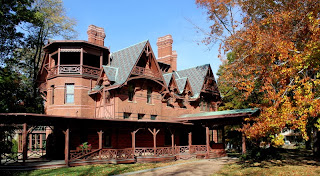 |
| Our train |
When last we left our
intrepid travelers, they were luxuriating at the Bee and Thistle Inn…
After my husband pried my fingers off the door to the inn (I
would gladly have stayed in our cozy room at least one more night), we boarded
the Essex Steam Train for a short ride through the woods along the Connecticut
River , followed by a riverboat trip up the river itself. The day
was cold and windy, but we braved the top deck to watch the river banks slide
by, a few houses tucked in here and there, and the scarlet and yellow trees that
seemed to grow right out of the rock in places.
As we floated by, what looked
like a ruined castle loomed up on the hill above us. Our trip narrator identified
it as Gillette Castle
 |
| The view from Gillette Castle |
 |
| See the dragon's head? |
When Gillette died, he had no one to leave his estate to and
was concerned with what would happen to this property, putting specific instructions
in his will to guarantee the property would not fall into the hands “of some
blithering saphead who has no conception of where he is or with what
surrounded.” In 1943, the Connecticut
government purchased the property, renamed the home Gillette’s Castle and the
184-acre estate became Gillette Castle
State Park
Next and final stop: Boston, where we were forced to hide
our resentment of the Boston Red Sox from rabid fans (Boston beat our home
team, the Tampa Bay Rays, in the playoffs) and we were lucky to find a hotel
room we could afford—the last game of the World Series was played the day we
flew home.



































